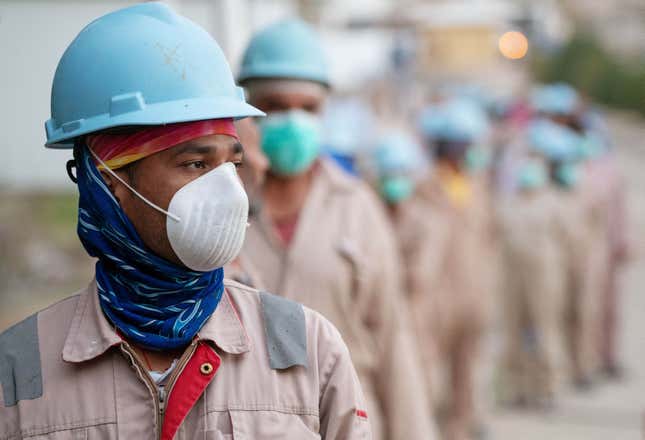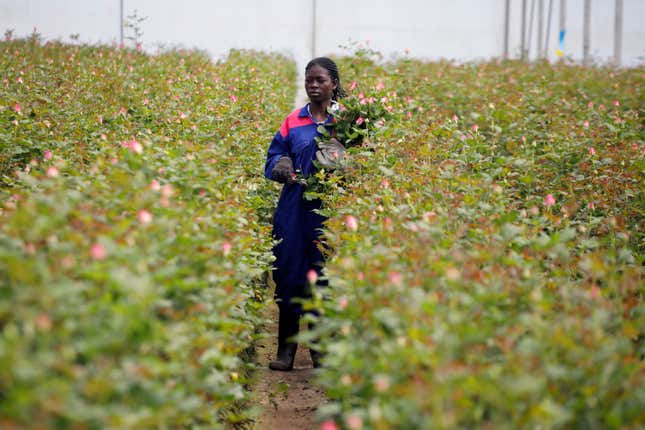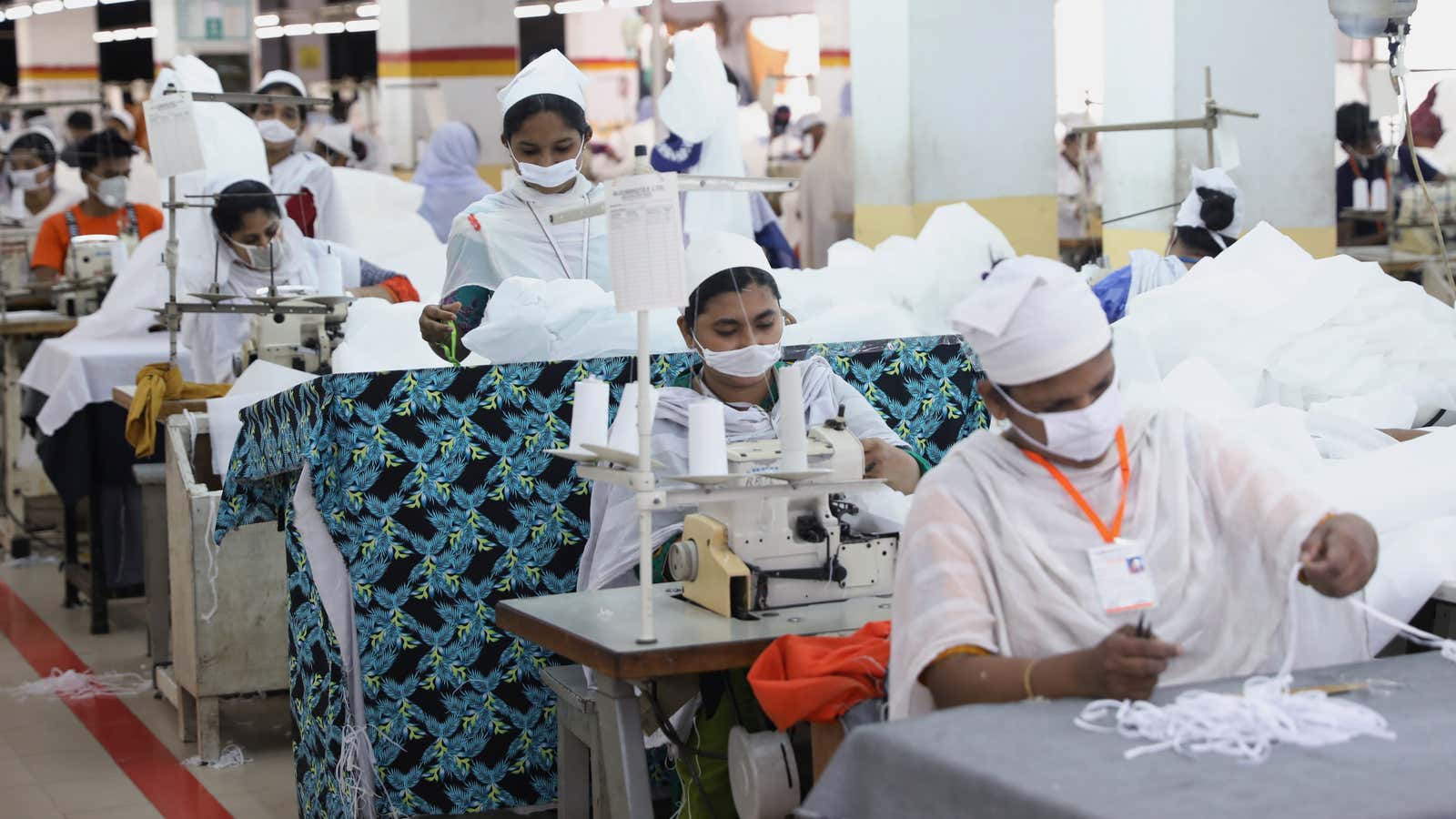As the coronavirus pandemic ripples around the world, it’s affecting all of us. But it’s having the most devastating impact on people invisible to many who are reading this: low-wage laborers who support large swathes of the global consumer economy.
Millions of workers in Bangladeshi garment factories, most of them young women, face layoffs as US and European clothing brands cancel orders and virus-prevention measures force factory lockdowns. In Qatar and other countries in the Middle East, migrant construction workers from South Asia are being quarantined in squalid camps with no clear indication of when, if ever, they will be allowed to return to their jobs. And in Kenya and Ethiopia, hundreds of thousands of employees who cultivate flowers for export could lose their jobs.
The International Labour Organization (ILO), a United Nations agency, estimates that this health crisis could increase global unemployment by nearly 25 million people, far exceeding the effects of the 2008 financial crisis. Western countries and corporations that have benefitted from inexpensive labor in low- and middle-income countries now bear responsibility for easing workers’ hardship.
In the garment industry, Western brands and retailers have been under increasing scrutiny and pressure from consumers, advocacy organizations, and trade unions to do the right thing by their suppliers in Asia. Several global companies, including Sweden’s H&M and Spain’s Inditex, have made commitments to pay for both completed orders and those under production. Many have not, citing store closures, stock they already have but cannot sell, and even the survival of their businesses.
Bearing the brunt of a global crisis
Garment factories across Asia have had to close down and lay off workers as their orders dry up, with fewer people spending on non-essential goods like the latest fashion. Bangladesh alone has seen more than $6 billion in Western orders cancelled in recent weeks. Rubana Huq, president of the Bangladesh Garment Manufacturers and Exporters Association, has described the situation as “apocalyptic.”
In a video appeal posted on YouTube, Huq pleaded with international brands and retailers to accept “current goods which are under production and which are ready.” She implored, “Please take them under normal payment terms.” Huq, whose family company owns several clothing factories, asked the Western companies for “three months’ support to the sector [that] has basically been of service to you for so long.”
Now workers are facing another grave threat: the virus itself. At the time of publishing this article, Bangladesh had confirmed more than 1,000 Covid-19 cases and 46 deaths attributed to the coronavirus, but those numbers are likely to rise quickly. On April 6, prime minister Sheikh Hasina ordered all garment factories closed, although those making masks and other personal protective equipment are exempted from the shutdown. In late March, Hasina announced a $590 million aid package to pay the wages of factory workers in export-oriented industries, including clothing. That won’t last long, however, as one month’s worth of garment industry salaries comes to $470 million, according to Huq.
Forced quarantine

In the six countries that make up the Gulf Cooperation Council (GCC)—Saudi Arabia, Kuwait, the United Arab Emirates, Qatar, Bahrain, and Oman—some 10 million migrant laborers from South Asia build hotels, stadiums, and airports. These workers now risk bearing the brunt of their host countries’ efforts to contain the rising number of Covid-19 cases in the region.
After a confirmed outbreak in a labor camp in Qatar, the country’s government closed off a large part of the industrial area near Doha where thousands of migrant workers reside. No one is allowed in or out of the industrial zone, which reportedly is rife with Covid-19 cases. Despite the outbreak in their ranks, many of the workers are continuing to build infrastructure for the FIFA World Cup scheduled for 2022. Others have been put on unpaid leave.
Earlier this month, the Qatari government announced that it would set aside $824 million to assure that quarantined workers, including those put on leave, get paid in full. But human rights advocates are concerned about the structure of the financial aid effort, because the money will go to employers in the form of loans with the expectation that the companies will then use the funds to pay their workers. “It is important that companies do not pass on the burden of repayment of these loans to the workers at a future point,” the advocacy group Migrant-Rights.org said in a tweet on April 1.
Mustafa Qadri, executive director of the labor rights research organization Equidem, cautioned against relying on businesses to protect workers’ interests. “Historically, when companies are facing financial trouble in the Gulf, they tend not to pay workers,” he said. “During this pandemic, companies know there will be no consequences or punishment if they delay wages or don’t pay workers.”
Other GCC governments are providing financial assistance to their citizens and businesses but have not announced plans to protect migrant workers, who constitute 80 to 90 percent of the populations in some of these countries. In Bahrain, for example, migrant workers aren’t included in the government’s plan to cover the wages of 100,000 private-sector employees.
Similarly, Saudi Arabia has committed to providing $32 billion to support local businesses. But it’s unclear whether any of that money will trickle down to migrant laborers. As Qadri said, “the governments need to commit to a strategy to reach workers directly and not just go through companies, because we know how companies behave.”
Flowers, cut

In some African countries, the horticultural sector has taken a hit as Western demand for cut flowers has withered, according to Geneva-based labor consultant Auret van Heerden. Flower exports from the continent have fallen by 50% or more because of canceled orders and flights (flowers are air-freighted), and are likely to dip further still as more lockdowns go into effect, van Heerden said. Some one million people employed directly and indirectly in the horticulture industry in Kenya are at risk of losing their jobs.
From African flowers to clothing made in Bangladesh, the companies and governments that depend on low-wage labor urgently need to extend assistance to workers who are suffering. “Workers and businesses are facing catastrophe, in both developed and developing economies,” according to ILO Director-General Guy Ryder. “We have to move fast, decisively, and together. The right, urgent, measures, could make the difference between survival and collapse.”
